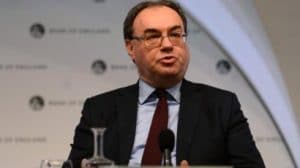The next head of the (BoE) has been revealed, with Andrew Bailey, the current Chief Executive Officer (CEO) of the (FCA) to take Mark Carney’s place.

Source: BBC
Unlike Carney, Bailey has agreed to serve a full eight-year term. He joins the Bank of England at a difficult time, with Brexit now all but guaranteed to happen at the end of January with the recent re-election of Boris Johnson.
Bailey of the Bank is the most able and competent BoE official I worked with: by far the steadiest under fire in the financial crisis. He won’t make waves unnecessarily. But his all round experience will help to steady economic policy at a challenging time for the UK.
— Nick Macpherson (@nickmacpherson2)
Commenting on the appointment, Nick Macpherson, the former head of the U.K. Treasury, said on Twitter today: “Bailey is the most able and competent BOE official I worked with: by far the steadiest under fire in the financial crisis. He won’t make waves unnecessarily. But his all-round experience will help to steady economic policy at a challenging time.”
In fact, due to Bailey’s experience and largely uncontroversial political stance, he has been viewed as a safe option to lead the British central bank. He has also had extensive experience as a former deputy governor at the BoE.
Andrew Bailey takes the BoE reins at a difficult time
It goes without saying that Bailey is inheriting the leading position at a difficult time. Because of Brexit, he will be taking the reins at the same time output for the economy has achieved the worst performance in a decade.
The appointment of Bailey is not a large surprise for the market, as he was the favourite to replace Mark Carney, as was reported by multiple media outlets. However, there was speculation that Minouche Shafik, a former deputy governor, would get the job. Bailey will receive £495,000 ($645,000) a year, and as of yet, his benefits package hasn’t been revealed.





Be First to Comment